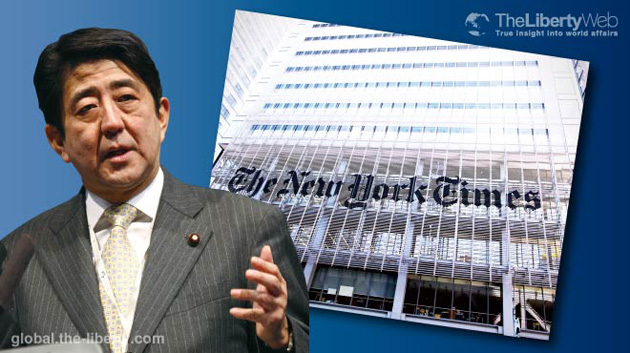The New York Times Bashes the New Japanese PM as a “Right-Wing Nationalist”
Shinzo Abe, the newly elected, conservative, Japanese prime minister, is working to solve the quarrels with China and South Korea over Japan’s conduct during the Second World War. In 1995, the Japanese government previously apologized to its neighbors in the Murayama Statement. The new Prime Minister has suggested issuing a more forward-looking “Abe Statement” which would replace the last proclamation. While the media in China and South Korea has sensationalized his move as “resurgent militarism,” a Western news outlet, the New York Times (NYT), has also harshly criticized Mr. Abe’s stance on this historical issue.
In an editorial on January 3rd, the NYT labeled Mr. Abe as “a right-wing nationalist,” whose revisionist view ought to “outrage South Korea, as well as China and the Philippines.” According to the article, “Mr. Abe’s shameful impulses could threaten critical cooperation in the region on issues like North Korea’s nuclear weapons program.”
However, this is not the first time that the NYT has criticized, or even condemned, the new Japanese prime minister. Soon after Mr. Abe’s Liberal Democratic Party seized a landslide victory in the general election, a Times’ editorial urged Mr. Abe to take a friendly stance toward China because “Japan voted for economic revival, not nationalist fantasies.” The repeated tone of these editorials suggests that the globally-known news outlet is determined to demean Prime Minister Abe. Their manner has been extremely acrimonious; for example, a December editorial declared that Mr. Abe “shamelessly denies” the issue of comfort women, whereas South Korea and other countries believe those people were kidnapped by the Japanese military to serve as “sex slaves.”
In the series of editorials, the New York Times has been clearly lacking a healthy attitude, and the writers haven’t been closely looking at historical facts. Firstly, the private brokers, not the military, gathered those comfort women and ran those military brothels. Most of those women were professional prostitutes, and they received extremely high wages in return for their servicing the members of the military. While cold-blooded brokers, who actually did kidnap women, existed in Korea, the Japanese police investigated such criminal misconduct and arrested those offenders. No sound evidence has served as proof that the Japanese military systematically abducted “comfort women”. Although a few elderly South Korean women claim Japanese soldiers kidnapped them, their testimonies actually suggest that their families sold them to private brokers because they were too poor to care for them. Of course, those stories are very sad, but they’re not good enough to support South Korea’s historical claims.
The comfort women originally became an issue only in 1983 because Seiji Yoshida, a former Japanese soldier, confessed that he had abducted a number of women from Jeju Island in South Korea in order to force them to work as comfort women during the Second World War. When the Asahi Shimbun, Japan’s major daily, featured the story to inflame the issue, the South Korean government started to use it as a diplomatic card against its former enemy. The Japanese government issued an apology, even though the Japanese politicians didn’t have evidence to prove the South Korean claim, because they were naïve enough to believe that they could settle that media problem with an apology.
Afterwards, a South Korean newspaper surveyed Mr. Yoshida’s claim. The investigative journalists interviewed local people around the island, and they discovered that his book was a poorly written piece of fiction. Later, Mr. Yoshida also admitted that he made up the story. Since the comfort women issue was a fabrication, which oddly wasn’t even discussed in the normalization talks between Japan and South Korea at the time, there is no reason to raise this topic over and over again.
Thus, the New York Times has “shamelessly” been straying away from any semblance of ethical standards for editorial reporting in the case of Prime Minister of Japan. It has been repeating South Korean propaganda, based on prejudice against Japan, stating that it was an authoritarian nation, which infringed upon the human rights of ordinary citizens. A kind piece of advice to the New York Times is as follows: it would be more accurate to accuse the South Korean organizations that have been “shamelessly” erecting “comfort women statues” in the United States than to attack Prime Minister Abe.



















